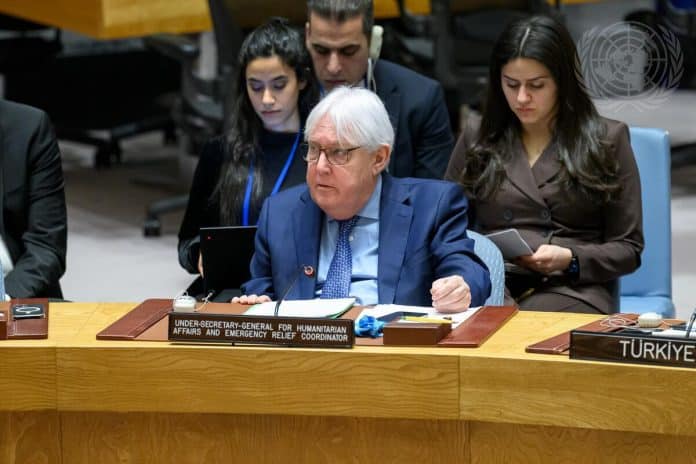UNDER-SECRETARY-GENERAL FOR HUMANITARIAN AFFAIRS AND EMERGENCY RELIEF COORDINATOR, MR. MARTIN GRIFFITHS— Briefing to the Security Council on the humanitarian situation in Syria 27 February 2024
Thank you, Madam President.This month marks one year since the catastrophic earthquakes that struck Türkiye and Syria in February 2023.As we reflect on the first anniversary of this tragedy, our hearts go out to families across the region who have endured such profound loss.The earthquakes, among the most severe in a century, wrought untold devastation, claimed thousands of lives and left millions of people in both countries injured, traumatized and homeless.With the remarkable support of the international community, crucial emergency relief was provided, including first aid, food and protection assistance, and shelter support.But in Syria, where the conflict is about to hit the 13-year mark, it is clear that much more is still needed to address the long-term humanitarian impact of the earthquakes. This includes ensuring the full restoration of basic services, and the provision of adequate and appropriate shelters, particularly for displaced pregnant women and girls.The same goes for the wider humanitarian crisis in Syria. Already one of the most severe crises in the world a year ago, it has only deteriorated over the last 12 months.Madam President,In 2024, Syria’s humanitarian outlook remains bleak.A staggering 16.7 million people now require humanitarian assistance – nearly three-quarters of the population and the highest number of people in need since the start of the crisis.Expanding hostilities in the north of Syria, and recent attacks in Damascus, Rural Damascus and Homs Governorates, continue to cause civilian casualties, displacement and extensive damage to critical infrastructure. In north-east Syria, recent strikes from mid-January have caused the partial or complete shutdown of hundreds of essential facilities, including water stations, health centers, schools, and other vital services. More than 1 million people, from major cities to villages, have reportedly been left without electricity.The reduction in access to electricity, water, and cooking fuel has exacerbated food insecurity and malnutrition, particularly among vulnerable members of society such as children, and pregnant and lactating women.Likewise, across Syria, the ongoing hostilities, the decline in essential services, prolonged water shortages, and a dire economic situation are all serving to increase people’s reliance on humanitarian aid.Yet access challenges, including daily security incidents, are constraining humanitarian workers’ ability to safely deliver essential assistance and to directly engage with affected populations.I reiterate my call to all parties involved in the conflict to respect international humanitarian law.This includes taking constant care to spare civilians and civilian infrastructure in the course of military operations.And it includes allowing and facilitating the rapid and unimpeded passage of humanitarian relief to people in need.Madam President,I welcome the decision by the Government of Syria earlier this month to renew its permission for the UN to use the Bab al-Salam and Al Ra’ee crossings to deliver humanitarian assistance for an additional three months, until 13 May 2024.I want to take this opportunity to welcome the incoming Permanent Representative of the Syrian Arab Republic to the United Nations, His Excellency Ambassador Koussay al Dahhak, through whom this decision was conveyed.This extension follows an earlier equally welcome decision by the Syrian Arab Republic in January to extend its permission for the use of the Bab al-Hawa border crossing to deliver assistance into north-west Syria for an additional six months, until 13 July 2024.In 2023, the UN and its humanitarian partners moved more than 5,000 trucks carrying essential aid through these crossings. Already in 2024, we have carried out more than 40 cross-border missions.This has allowed us to provide essential aid to 2.5 million people every month and to administer over 1 million medical procedures.We continue to advocate for humanitarians to be afforded the space needed to decide on the quickest, most efficient way to deliver assistance to those who desperately need it without unduly politicizing such decisions. It is evident that cross-border assistance will continue to be crucial for people in the north-west for the foreseeable future.It is also clear that the expansion of crossline deliveries throughout Syria, including to the north-west, is a humanitarian imperative.Madam President,The humanitarian community remains absolutely committed to providing the assistance that people need across Syria. But we cannot do so unless we have the required funding. Last year’s Humanitarian Response Plan received less than 40% of the required funding – the worst-funded response plan since the start of the conflict.Top of FormThe earthquakes of February 2023, as devastating as they were, could have been the moment when we said, “the people of Syria have suffered enough”. However, the international attention, generous mobilization of resources, and solidarity behind the response unfortunately proved momentary.One year on, the people of Syria are facing a worse humanitarian situation than ever before.As international attention wanes, the suffering and despair of the people of Syria is intensifying.We must not allow ourselves to become resigned to the current situation.We must continue to urge respect for international humanitarian law, including the protection of civilians, and enhancing safe and unimpeded humanitarian access.We must see an increase in levels of funding for the humanitarian response.And more than anything, we must see a renewed and genuine commitment to a political solution to end the conflict.Thank you.

